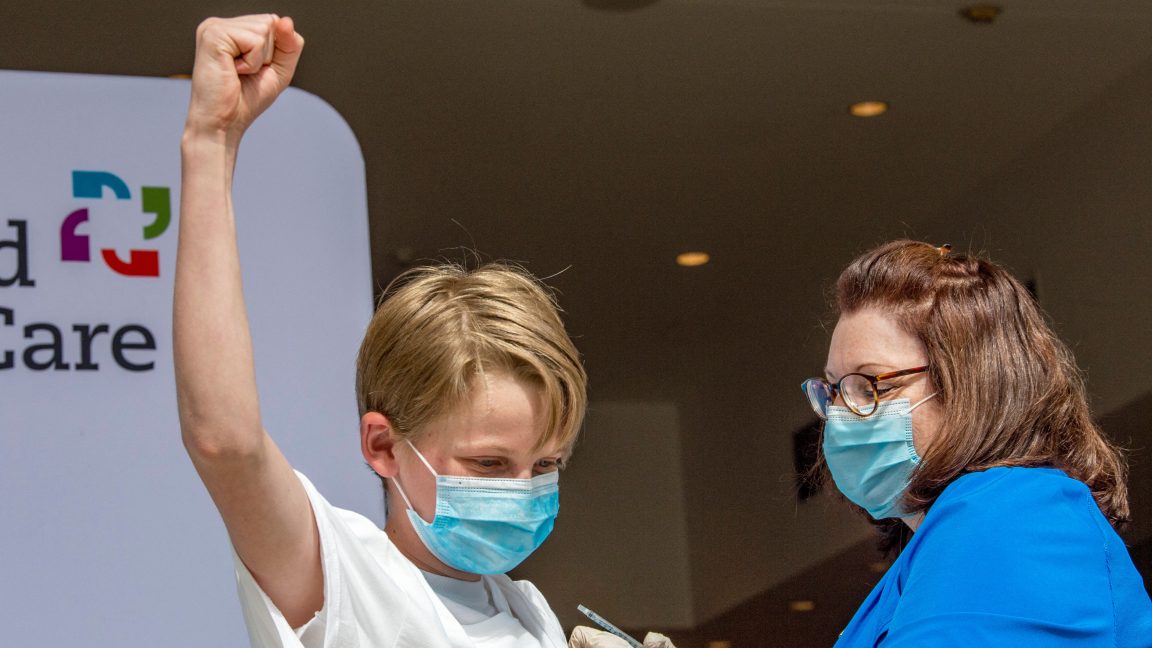
COVID shots protect kids from long COVIDand dont cause sudden death
arstechnica.com
Good news COVID shots protect kids from long COVIDand dont cause sudden death Researchers recommend kids stay up to date on the COVID vaccines. Beth Mole Feb 24, 2025 6:57 pm | 19 A 13-year-old celebrates getting the Pfizer-BioNTech COVID-19 vaccine in Hartford, Connecticut, on May 13, 2021. Credit: Getty | JOSEPH PREZIOSO A 13-year-old celebrates getting the Pfizer-BioNTech COVID-19 vaccine in Hartford, Connecticut, on May 13, 2021. Credit: Getty | JOSEPH PREZIOSO Story textSizeSmallStandardLargeWidth *StandardWideLinksStandardOrange* Subscribers only Learn moreCOVID-19 vaccines cut the risk of long COVID by between 5773 percent in kids and teens, according to a study published today in JAMA Network Open. And there's more good news:A second study published today in the journal offered more data that the now-annual shots are not linked to sudden cardiac arrest or sudden cardiac death in young athletesa claim that gained traction on social media and among anti-vaccine groups during the acute phase of the pandemic.Together, the studies bolster current recommendations that children and teens should stay up to date on their COVID-19 vaccines, which are estimated to have prevented more than 3 million deaths and more than 18 million hospitalizations in the first two years of their use. So far, the recommendations for kids have largely gone unheeded; only 14 percent of children aged 5 to 17 are up to date on their 20242025 COVID shot. Surveys suggest that parents largely think the vaccines are unnecessary, given that most children only have mild COVID infections.Still, not all infections are mild, and even mild cases can lead to long COVID, according to the authors of the first study. An estimated 1 percent to 3 percent of children infected with SARS-CoV-2 will develop long COVID, defined as having symptoms that continue or develop four or more weeks after the initial phase of infection. With tens of millions of kids getting infected with the pandemic virus, a large number of them are at risk of developing the condition.The finding that the vaccines substantially reduce the risk of long COVID in kids echoes findings seen in studies on adults. However, studies on children have been limited and inconsistent.For the new study, led by researchers at the Centers for Disease Control and Prevention, kids from Florida, Texas, Arizona, and Utah, all aged between 5 and 17, were followed between December 2021 and March 2023. They had no history of SARS-CoV-2 infections before the study and were tested for the new infections via weekly nasal swabs. In all, 622 kids tested positive for SARS-CoV-2 during the trial and were eligible to be in the analysis. Of the 622, 28 developed long COVID, 12 of whom (43 percent) were unvaccinated, and 594 acted as controls, 136 of whom (23 percent) were unvaccinated.Benefits and a non-existent riskUsing an adjusted odds ratio, the researchers found that vaccination reduced the likelihood of developing long COVID with one or more symptoms by 57 percent, and reduced the likelihood of developing long COVID with two or more symptoms by 73 percent. Vaccination prior to infection was also linked to a 75 percent reduction in risk of developing long COVID that impacted day-to-day functioning. The authors note that the estimates of protection are likely underestimates because the calculations do not account for the fact that vaccination prevented some children from getting infected in the first place."Our findings suggest that children should stay up to date with current COVID-19 vaccination recommendations as vaccination not only protects against severe COVID-19 illness but also protects against [long Covid]," the authors conclude.In a second short report in JAMA Network Open, researchers helped dispel concern that the vaccines could cause sudden cardiac arrest or sudden cardiac death in young athletes. This is an unproven claim that was fueled by anti-vaccine advocates amid the pandemic, including the new US Health Secretary and long-time anti-vaccine advocate Robert F. Kennedy Jr.While previous analyses have failed to find a link between COVID-19 vaccines and sudden cardiac deaths, the new study took a broader approach. The study, led by researchers at the University of Washington, looked at whether the number of sudden cardiac arrests (SCA) and sudden cardiac deaths (SCD) among young athletes changed at all during the pandemic (20202022) compared with prior years (20172019). The researchers drew records from the National Center for Catastrophic Sports Injury Research. They also collected medical records and autopsy reports on cases among competitive athletes from the youth, middle school, high school, club, college, or professional levels who experienced sudden cardiac arrest or death at any time.In all, there were 387 cases, with no statistically significant difference in the number of cases in the years prior to the pandemic (203) compared with those during the pandemic (184)."This cohort study found no increase in SCA/SCD in young competitive athletes in the US during the COVID-19 pandemic, suggesting that reports asserting otherwise were overestimating the cardiovascular risk of COVID-19 infection, vaccination, and myocarditis," the authors conclude.Beth MoleSenior Health ReporterBeth MoleSenior Health Reporter Beth is Ars Technicas Senior Health Reporter. Beth has a Ph.D. in microbiology from the University of North Carolina at Chapel Hill and attended the Science Communication program at the University of California, Santa Cruz. She specializes in covering infectious diseases, public health, and microbes. 19 Comments
0 Comments
·0 Shares
·68 Views


